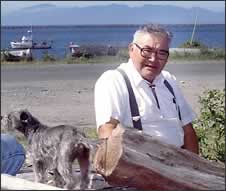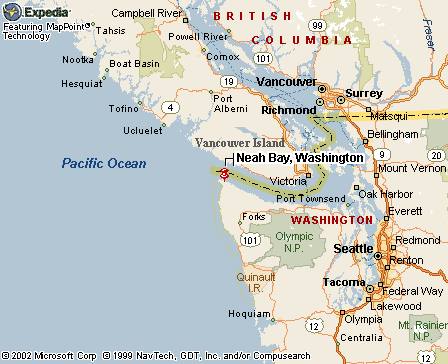|
|
Canku Ota |
|
|
(Many Paths) |
||
|
An Online Newsletter Celebrating Native America |
||
|
December 13, 2003 - Issue 102 |
||
|
|
||
|
Makah tribal elder readily shared treasures of his wisdom and culture |
||
|
by Mike Lewis - Seattle Post-Intelligencer
Reporter
|
||
|
credits: Makah
tribal elder John Hottowe and his dog, Henry, in front of their
home on Neah Bay. "He gave of his heart," recalls his
daughter, Jean Vitalis. Phil H. Webber / P-I 1995
|
|
A leader in preserving Makah tribal culture who taught ancient songs and pushed to reintroduce ceremonial whaling, Hottowe, 80, died last week from stroke complications. His family and friends said he was a man who emerged generous and unscathed from a tough upbringing. "My dad was extremely accepting and tolerant person, never bitter," said his daughter, Jean Vitalis, 53, of Neah Bay. "He gave of his heart." And that, in part, is what his daughter called his box of treasures, filled not with material wealth but knowledge and wisdom. The accounting of Hottowe's life, she said, can be taken by examining his careful accumulation of things in that box: the songs and dances of his mother's culture; the unhurried tolerance of a mixed-race man born money-poor; and a generous spirit that allowed him to pass his wisdom and culture to another generation. "His status (in the Makah Tribe) starts with this box of treasure, the protocols of our people," she said. "That is his credibility. That is his life." Hottowe's life began on May 12, 1923, as John Hatva, the son of a Czech immigrant and a Makah mother, both migrant farm workers. His brother and two sisters spoke Makah to their mother and English to their father. At school, the children were forbidden from speaking the tribal language. Those schools often changed as his parents looked for work. When they were home on tribal lands in the Olympic Peninsula, life wasn't any easier, and tribal members distanced themselves from a Makah who married a white man. "There was a time when (tribal members) didn't feel that she should be living here with her white husband," Vitalis said. Outside the reservation, the opposite was true. "But he never expressed any anger over that." Rather, he became a passionate defender of his country, enlisting in the military for World War II. He left the service as a decorated veteran with more than 50 missions under his belt as a gunner and radio operator in Navy bombers and torpedo planes. He once was shot down during the Battle of Leyte Gulf in the Philippines. After the war, he settled in Neah Bay and worked in civil service at the Air Force base there. During these years, he began to expand his vast and deep knowledge of not only Makah history but also all of Pacific Northwest tribal culture. "In the 1960s, we lost some of the older men," said Makah elder, Ed Claplanhoo, 75, a longtime friend. "We started losing people who carried on the vocal tradition. Several of the men took over to preserve the singing and dancing." Hottowe was among them. By the 1970s, the treasure box had grown, and Hottowe was known as a man who held the respect of the tribe. When he began to notice that the young people hadn't stepped forward to learn, to acquire the wealth of the box, he began teaching. C. Wade Green, 32, was an eager student. His grandfather was close to Hottowe -- the two wrote and learned tribal songs together -- and he considered the man a second grandfather. "I started learning from him when my grandfather passed away," Green said. "He started guiding me." Green said it was after those lessons when he awoke one rainy February morning in Neah Bay with a song about humility in his head. He didn't recognize it and assumed he had heard it somewhere in lessons. When he went to Hottowe for advice, it was then he learned that the teaching had begun to pay off. "He offered me the advice that it was a new song, a gift from my ancestors. He explained that how he composed songs." During those years, Hottowe also worked with other Pacific Northwest tribes and taught tribal culture classes at Evergreen Community College. In the 1990s, he and other tribal elders -- some whose parents had participated in the last hunt nearly a century earlier -- advocated a return to isolated ceremonial whaling. Over the objections of some animal-rights groups, the Makah caught and killed a gray whale in May of 1999, six days after Hottowe's 75th birthday. At the time, Hottowe was happy about the hunt but he expressed some worries about the technique of the harpooner. At his three-part memorial service Tuesday -- tribal, military and Presbyterian -- dozens of family and friends drummed to clear his path to the other world. They knew that the treasure box again must filled and emptied by another. "He was our cultural and spiritual leader," Claplanhoo said. "He was very instrumental in keeping the culture alive for many of the tribes in the Northwest. If we lose that, we don't have anything." |
|
|
www.expedia.com |
|
|
||
|
|
||
| Canku Ota is a free Newsletter celebrating Native America, its traditions and accomplishments . We do not provide subscriber or visitor names to anyone. Some articles presented in Canku Ota may contain copyright material. We have received appropriate permissions for republishing any articles. Material appearing here is distributed without profit or monetary gain to those who have expressed an interest. This is in accordance with Title 17 U.S.C. Section 107. | ||
|
Canku Ota is a copyright © 2000, 2001, 2002, 2003 of Vicki Lockard and Paul Barry. |
||
 |
 |
|
|
The "Canku Ota - A Newsletter Celebrating Native America" web site and its design is the |
||
|
Copyright © 1999, 2000, 2001, 2002, 2003 of Paul C. Barry. |
||
|
All Rights Reserved. |
||
 Most
people wouldn't be surprised to learn that John Hottowe achieved
enhanced social status from a vast box of treasure. More unusual
is that the prestige came from what the Makah elder gave, not what
he hoarded.
Most
people wouldn't be surprised to learn that John Hottowe achieved
enhanced social status from a vast box of treasure. More unusual
is that the prestige came from what the Makah elder gave, not what
he hoarded.